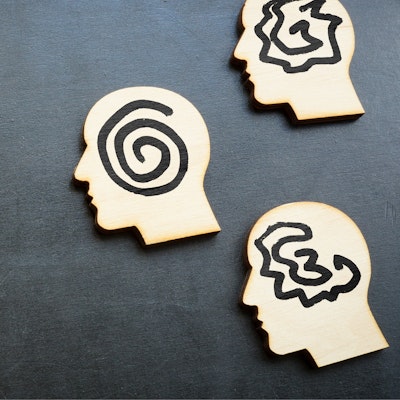Society
Psychology

Why do some conversations succeed while others stumble? The neurology and psychology of communication offer surprising explanations for why human connection goes right or wrong. Join in a live experiment — and explore how the right conversation, at the right moment, can change everything.

From the ancients to our forefathers to our modern-day achievement-obsessed culture, the question of what makes us happy continues to perplex. Why are we eternally fascinated by the pursuit of happiness, and will we ever agree about what makes us truly happy?

Experts on well-being share why we all need family connections, community wisdom and the weave of social fabric.

Three leaders discuss the aspects of well-being, agency and purpose that are vital to the holistic development of youth in today’s world. How can society help them develop into confident, purposeful, productive and resilient adults?

The experience of loss alters the map of the world imprinted on our brain, disrupting patterns and expectations as it struggles to form new ones. Grief is a kind of longing, not only for what has been lost but for the innocent assumption that our familiar world will remain with us always. We speak of resilience and healing, but in Grief is for People, author Sloane Crosley...

Scientific investigation is laser focused on psychedelics to treat post-traumatic stress disorder (PTSD), ease end-of-life anxiety, and address mental health challenges, including addiction. The FDA has issued draft guidelines to drug sponsors studying psychedelic-assisted therapy as it considers an application for MDMA-assisted therapy for use in PTSD care. As regulators...

Mental health crises are plaguing Americans. Despite parity mandates that require mental health services to be reimbursed like any other medical service, clinician shortages, knowledge gaps, inequitable access to services, lack of culturally appropriate treatment models, and stigma combine to undermine effective care. To address the growing crisis, we need more research an...

Whether you love setting New Year’s resolutions or ignore them entirely, there’s still a certain mix of nostalgia and excitement over the ending of one year and the possibilities that lay ahead. We’ve gathered five big ideas that offer some food for thought as you head into 2024, including a new mindset for thinking about careers, a glimpse into the history of the cosmos,...


Teenagers and young adults today are dealing with challenges their parents never experienced and couldn’t have prepared for. Nobody has a map and the road to resolution can be bumpy for all involved. Two adolescent psychologists published books last year aimed at helping parents understand and empathize with what their kids are going through and guiding everyone toward hel...


Living a happy life isn’t as simple as having a smile on your face all the time. We often think that our negative emotions should be minimized and repressed, but acknowledging and managing them is actually key to achieving a healthy baseline. Author and Harvard professor Arthur Brooks studies the latest happiness research across behavioral science, philosophy, psychology,...


The human capacity for empathy allows us to communicate, collaborate and understand each other. But we all know empathy isn’t always easy, and we can feel worn down by the effort. MIT professor and researcher Sherry Turkle studies empathy, and particularly how technology can undermine our natural human tendencies to connect. After several books and many decades of work com...


When Duke divinity school professor Kate Bowler wrote her best-selling memoir, “Everything Happens for a Reason (and Other Lies I’ve Loved),” she was grappling with the consequences of a shocking cancer diagnosis. Many of the common messages about hardship, tragedy and success that she’d grown up hearing – and even studied as a religious scholar – no longer seemed to make...


In today’s world, we tend to switch jobs more frequently than previous generations, and are more likely to have multiple jobs. Side gigs where we express passions or find meaning are also common, and many juggle additional roles as caregivers and community members, as people always have. In short, many of us are focused on a lot more than just climbing a corporate ladder....

Lisa Damour is a clinical psychologist, author, and a senior advisor to the Schubert Center for Child Studies at Case Western Reserve University. We caught up with her about how psychologists understand mental health and solicited her advice on how parents can encourage healthy social media use for their teens.

Acclaimed authors and experts Annie Murphy Paul, Sheena Iyengar, and Keith Sawyer explore the multifaceted nature of decision-making, choice, and creativity. Through their unique perspectives, this trio delves into the intersection of psychology, neuroscience, and social dynamics, shedding light on how our choices and creative processes shape our lives and the world around...

Over the past decade, levels of anxiety, depression, self-harm, and suicide have increased dramatically, but the causes are more nuanced than the headlines suggest. This session unpacks the data and real-world learnings to shed light on the changes — at the policy, family, school, and community levels — that have the most potential to improve kids’ well-being.

Renowned psychologists Lisa Damour, author of The Emotional Lives of Teenagers, and Laurence Steinberg, author of You and Your Adult Child, delve into the complex landscapes of adolescence and young adulthood in today’s society. Both have devoted their careers to studying and understanding adolescents — Damour as a clinical psychologist working with families and organizati...

Author and Harvard professor Arthur Brooks introduces the exploding science of happiness, which combines philosophy, psychology, and neuroscience into a set of actionable strategies for everyday life. Learn how emotional self-management can transform the way we experience the world and improve all facets of life.

“Self-care” is the buzzword of the moment. But far before face masks and digital detoxes, ancient philosophers were thinking of ways to enhance human flourishing. How do their ideas match up to today? Yale philosophy professor Tamar Gendler sits down with author Bruce Feiler, who traveled across the U.S. collecting stories on how we deal with life’s transitions. From mille...

DOORS OPEN AT 6PM. In the film Eternal Sunshine of the Spotless Mind, Kate Winslet’s character erases painful memories of her ex-boyfriend. Could this be possible in real life? Neurotechnology, like decoded neurofeedback, offers ways to modify or erase unpleasant memories. Advocates believe it could improve mental well-being and heal emotional trauma. Forgotten memories co...







